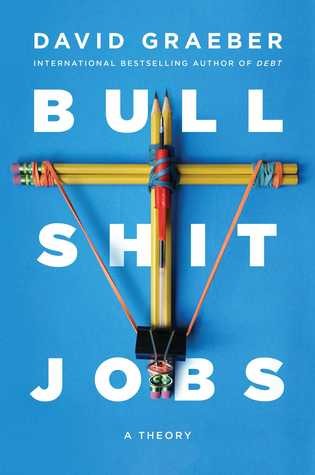fountainhead quoted Bullshit Jobs by David Graeber
I would like to end this book with a few thoughts about the political implications of the current work situation, and one suggestion about a possible way out. What I have described over the last two chapters are the economic forces driving the proliferation of bullshit jobs-what I've called managerial feudalism-and the cosmology, the overall way of imagining the place of human beings in the universe, that allows us to put up with this arrangement. The more the economy becomes a matter of the mere distribution of loot, the more inefficiency and unnecessary chains of command actually make sense, since these are the forms of organization best suited to soaking up as much of that loot as possible. The less the value of work is seen to lie either in what it produces, or the benefits it provides to others, the more work comes to be seen as valuable primarily as a form of self-sacrifice, which means that anything that makes that work less onerous or more enjoyable, even the gratification of knowing that one's work benefits others, is actually seen to lower its value-and as a result, to justify lower levels of pay.
All this is genuinely perverse.
In a sense, those critics who claim we are not working a fifteen-hour week because we have chosen consumerism over leisure are not entirely off the mark. They just got the mechanisms wrong. We're not working harder because we're spending all our time manufacturing PlayStations and serving one another sushi. Industry is being increasingly robotized, and the real service sector remains flat at roughly 20 percent of overall employment. Instead, itisbecause we have invented a bizarre sadomasochistic dialectic whereby we feel that pain in the workplace is the only possible justification for our furtive consumer pleasures, and, at the same time, the fact that our jobs thus come to eat up more and more of our waking existence means that we do not have the luxury of-as Kathi Weeks has so concisely put it-"a life," and that, in turn, means that furtive consumer pleasures are the only ones we have time to afford. Sitting around in cafes all day arguing about politics or gossiping about our friends' complex polyamorous love affairs takes time (all day, in fact); in contrast pumping iron or attending a yoga class at the local gym, ordering out for Deliveroo, watching an episode of Game of Thrones, or shopping for hand creams or consumer electronics can all be placed in the kind of self-contained predictable time-slots one is likely to have left over between spates of work, or else while recovering from it. All these are examples of what I like to call "compensatory consumerism." They are the sorts of things you can do to make up for the fact that you don't have a life, or not very much of one.
— Bullshit Jobs by David Graeber (71%)

